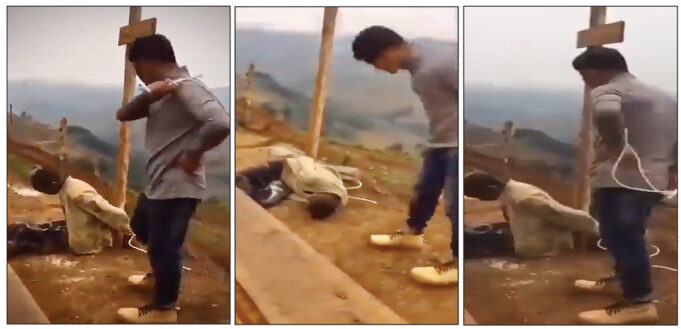By Emmanuel Ali
A Chinese businessman was sentenced to 20 years imprisonment in Kigali, Rwanda, after a video of him beating a worker tied to a pole went viral last year.
According to Associated Press and Agence France-Presse, Sun Shujun, 43, was the manager of a mine that produces cassiterite, the primary source of tin metal. The viral 45 second clip shows Mr. Sun using a rope to violently strike a worker who was defenseless and tied to a pole as onlookers watched.
Mr. Sun confessed in court to the assault of two mine workers because he was “frustrated and fed up with them constantly stealing minerals,” the wire services reported. He also tried to argue for his release claiming that the workers had been compensated more than one million Rwandan francs (about U.S. $1,000) and given a “reconciliation letter.”
However, the prosecution accused him of assaulting four people and argued that the victims only accepted the payments “because they were traumatized and afraid of him.”
After viewing the horrifying video, Judge Jacques Kanyarukiga said Mr. Sun “tortured the victims and issued corporal punishment with malicious intent, and this is a grave crime.” After the court’s verdict, Mr. Sun was immediately placed in handcuffs and taken away. Renzaho Alexis, a Rwandan native, was also sentenced to 12 years for his alleged role as an accomplice in the beatings. Sun has up to 30 days to appeal.
The verdict was rendered in April.
The Chinese embassy in Rwanda acknowledged the verdict in a statement released via Twitter urging Chinese citizens living in African country to abide by local laws.
“Meanwhile, the embassy calls for the case to be handled appropriately in a rational, fair and just manner and requests the legitimate rights of the Chinese citizens to be properly protected,” the embassy statement said.
For many critics, this video is a representation of what they fear as China’s foreign diplomatic and economic affairs in Africa: exploitive.
The Chinese government adopted The Belt and Road Initiative in 2013, lending money to several countries including Rwanda and other African countries.
This loan was seen as a debt entrapment by critics.
Over in Guinea, the natives receive very little return from the Chinese monopoly on the bauxite material, according to The Interpreter (published by the Lowy Institute).
In 2018, workers at a Boké mine in Guinea went on strike for two weeks in protest over the arrest of a union leader, The Interpreter reported. In a region already suffering from wealth discrepancy between the mining companies and the poor local citizens, tensions turned into riots in 2017 over health and environmental issues but were suppressed by the government forces, the Lowry Institute publication said.
In 2019, workers at the CDM-China-owned mine in the Telimélé district in Guinea went on strike demanding better working conditions, it added.
In 2020, a Chinese national, who owned a coal mine in Zimbabwe, was accused of shooting two workers. The workers had complained about money they were owed, according to VOA News.
Other African leaders are beginning to take notice: The Democratic Republic of Congo began reviewing a $6.2 billion minerals-for-infrastructure deal that was made with China in 2008. According to Bloomberg, the contract, which has been renegotiated several times since its implementation, promised a $3.2 billion investment by China in a copper-cobalt mine and another $3 billion worth of infrastructure projects, all paid for by mining revenue.
Over a decade later, less than a third of the infrastructure funding has been disbursed, and the mining project (known as Sicomines) has only received about three-quarters of the promised investment, according to the government. Nicolas Kazadi, former finance minister for the Congo, also questioned whether the interest rate of the loan was fair.













